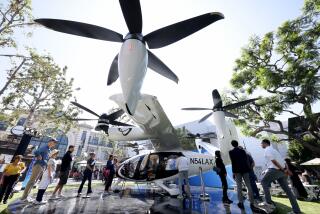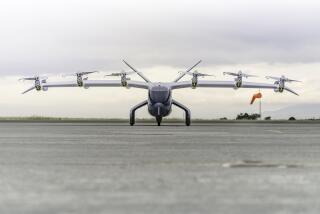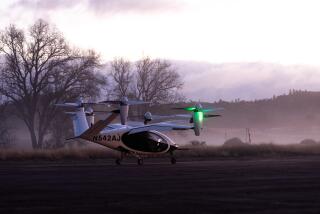Airborne Hopes : Ex-TWA Pilotâs New Plane Must Clear FAA, Compete for Airspace Among Corporate Jets
In aviation, as with any other business, the ultimate question is always: Will it fly?
Eight years ago Robert Adickes, a retired TWA pilot, founded Avtek Corp., a private Camarillo firm that has been developing a fuel-efficient corporate plane built mostly of plastic composites made by Du Pont.
Besides its plastic design, the plane offers some other different features. Its two âfanjetâ engines are essentially jet engines that have propellers, and are capable of reaching speeds of 400 m.p.h., slower than the bottom-end corporate jets but offering better fuel mileage. The plane also features a small V-shaped wing atop the fuselage that, according to Adickes, creates less wind drag than the wider horizontal wings found on most planes.
Because the plane weighs less than traditional metal-bound corporate planes made by Gates Learjet, Gulfstream, Beech and Cessna, Adickes says his plane, which will seat six to 10 people, can travel 2,400 miles without stopping for fuel. Given the planeâs $1.75 million price tag, Adickes is betting it will offer enough cost savings to appeal to buyers of executive jets used to paying $2 million-plus for new corporate planes in its class.
Adickes, 66, has lined up 22 would-be distributors who have ordered 110 planes and made down payments totaling more than $6 million. It adds up to more than $190 million worth of future orders.
But bringing a new plane to market isnât as easy as introducing a new personal computer. Adickes must still win the necessary Federal Aviation Administration approvals so he can commercially build and market his plane.
Thus far investors have put up $27.5 million, Adickes said, to produce a prototype of the plane, called the Avtek 400A, which he says he has test-flown 150 times. The money was put up by Adickes, Du Pont, Dow Chemical, Nomura Securities of Japan, the government of Finland and several other parties. Some of those investors acquired equity stakes in exchange for their investments, but Adickes said he still owns 65% of Avtek.
Adickes must raise another $20 million to pay for the necessary testing required by the FAA and for other development costs. Adickes, Avtekâs president, said he has rejected three offers to sell the company. âIâm greedy and the offers they made me are a little bit low,â he said.
At the moment, though, âWeâre in a holding pattern awaiting this financing,â Adickes acknowledged. The company has only six full-time employees.
If Avtek gets the money it needs and if âeverything goes well, we should be certified in the fourth quarter of 1989,â Adickes said, adding that Avtekâs first deliveries would begin shortly after that. The next question is: Will the aircraft sell?
The question goes beyond Avtekâs novel design. Overall, the general aviation market, consisting of private planes and corporate aircraft, has been in a 10-year depression and shows little sign of improving. Annual sales now are less than 2,000 planes, down 89% from 1978 when sales peaked at 17,800 planes. And the sales slide produced a stockpile of used aircraft that corporate buyers can tap at bargain prices.
âThe biggest competition weâll have is used airplanes,â Adickes said.
But word of Adickesâ new plane has started to make its way through the industry, and Alan Weber, head of Weber Avex, an aircraft consulting firm in Port Hueneme, said that the used-plane supply is starting to dwindle.
By the time the Avtek 400A could come to market in the early 1990s, he said, demand for new aircraft ought to be picking up. Weber said that if Avtek âcan deliver what they say they have, at a competitive price, they probably stand a good chance of having a financial success.â
Avtek will have plenty of competition from established, traditional corporate jet designs, including the popular Cessna Citation II, which seats eight and costs $2.5 million new, and the Beech King Air 300 (eight to 10 seats for $2.8 million.)
But Adickes figures his biggest competition will be from Beechâs new Starship entry, which also has a radical design of graphite composites and uses twin jet engines. Beechâs plane, which will seat eight to 10 passengers and cost $3.7 million, has yet to be certified by the FAA. But Beech, a unit of Raytheon Corp., expects certification this month and plans to make its first deliveries by the end of 1988.
Despite Beechâs likely head start, Adickes is unimpressed. âThe only advantage we have is weâre faster, have longer range, twice the fuel efficiency and we sell for less than half their price,â he said.
Andrew C. Nolin, Avtekâs southeast director in charge of fund-raising, said the Avtek entry will appeal especially to charter services. If a charter manager âcan cut his operating cost in half, needless to say which plane he would buy,â Nolin said.
One charter executive, Michael Friedman, chief operating officer of NetAir International, a Van Nuys-based charter service, declined to predict the marketâs reaction to the Avtek 400A. But he said âthat type of effort has real potential. General aviation needs a low-cost, high-speed aircraft, and that may or may not be answered by Avtek.â
The company got its start in 1980 after Adickes retired from TWA, where he was a pilot for 40 years. He was joined by several other aviation veterans--dubbed âThe Geritol Groupâ by Adickes--who also believe in the planeâs potential as a best-seller.
Then, as now, the big stumbling block is getting the plane certified by the FAA. That wonât happen until the aircraft passes about 1,700 tests. The FAA does not carry out most of the tests; they are performed by FAA-designated engineers, with Avtek having to pick up the tab. Adickes said the tests will cost about $16 million.
Certification is neither quick nor guaranteed. Moya Lear, the wife of Learjet inventor William Lear, worked for several years to win approval for a graphite-body fanjet that her husband had started designing before he died in 1978. But after the British government invested $72 million, the plane never completed certification tests and her firm, Fan Holdings, went bankrupt in 1985.
âThe only thing that precludes airplanes from getting certified is the people run out of money prematurely,â said Barron Thomas, who owns an airplane dealership in Dallas. âItâs playing a government red-tape waiting game.â
Thomas is convinced the Avtek design can be certified and do well on the market because the plane offers something new to buyers. âManufacturers, with the exception of the Starship, have done practically nothing in 10 years to improve their product,â he asserted.
Although Thomas has not ordered any of Avtekâs planes, he said that if Adickes can keep Avtek afloat, âheâs got a 100% chance of getting approvalâ from the FAA.
Although Adickesâ 22 distributors have ordered an average of five planes--which required deposits of between $50,000 and $100,000 per aircraft--to get the exclusive rights to market Avtekâs jet, the deposits are in escrow and canât be used to finance the planeâs development. The deposits also are refundable if the Avtek 400A fails to earn government approval, he said.
Adickesâ current plan is to get Illinois and Pennsylvania either to lend him the $20 million or guarantee loans made by private investors in exchange for building Avtekâs parts and assembly plants in those states if he wins FAA certification.
The states were chosen because they have relatively low wage rates, which is important because labor will be a major cost of building the Avtek 400A, Adickes said. One of the advantages of the composite aircraft design is that the exterior essentially can be wrapped around the skeleton of the plane in less time and at lower cost than its takes to weld together every small scrap of metal.
The Pennsylvania effort looks promising. Gov. Robert P. Casey included Avtek among seven state-funded projects aimed at increasing employment. Avtekâs proposal calls for Pennsylvania to lend $8 million to Avtek--at below money-market interest rates--in exchange for Avtek building a parts facility in central Pennsylvania, the former site of a Piper aircraft plant.
Adickes expects his firmâs total production employment to reach 1,100; about 400 of the jobs would be in Pennsylvania. The plan recently was unanimously approved by the stateâs House of Representatives, and is expected to get state Senate approval early in 1988.
But Illinois is another matter. Two weeks ago Illinois Gov. James R. Thompson expressed serious doubts about Avtekâs proposal to build a plant in southern Illinois in exchange for a loan or loan guarantee of about $12 million from Illinois. At a news conference, Thompson said he was concerned about giving Avtek financial support when the 400 to 600 jobs Avtek is proposing might be years down the road, if at all.
Adickes contends he is not worried if the Illinois deal falls through. He already is trying to line up a similar deal in western Alabama--another low-wage state--near the Mississippi border, but with private investors instead of a state agency.
More to Read
Inside the business of entertainment
The Wide Shot brings you news, analysis and insights on everything from streaming wars to production â and what it all means for the future.
You may occasionally receive promotional content from the Los Angeles Times.











